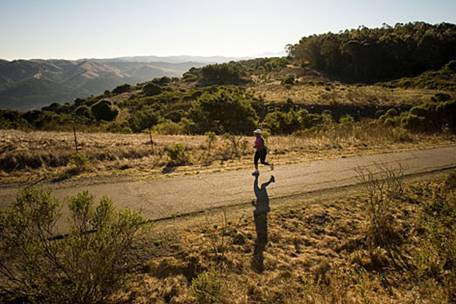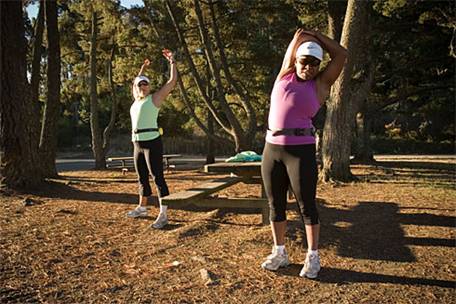|
The Aging Boom Lowers on Boomers
By Mary Brophy Marcus, USA Today
September 27, 2007

Forever young: Lydia Nayo, 55, of Oakland runs 6 miles through Tilden Regional Park in Berkeley to prepare for a half-marathon — and stay ahead of the ills of aging.

Talking about that generation:
Pamela Calloway, 49, left, and Lydia Nayo stretch before running.
Ambush.
That's how Lydia Nayo describes her first hot flash.
"There I was in Sears and I went up in flames," says Nayo, 55, a real estate broker from Oakland.
For Nayo and many other baby boomers, when age-related health problems first strike, they often come as a jolt.
"Even though they realize they're hitting a time of life when things may arise, like menopause for women, erectile dysfunction for men, or getting a diagnosis like arthritis, when it actually happens it can be very disturbing," says Robert Butler, president of the International Longevity Center in New York, and the founding director of the National Institute on Aging in Bethesda, Md.
According to the U.S. Census, there are 77.5 million baby boomers, those who were born between 1946 and 1964.
Those babies now span ages 43 to 61. For this group, conditions such as arthritis, high cholesterol, cancer, sports injuries and obesity are more common than they are in younger adults, says geriatrician Neil Resnick, director of the University of Pittsburgh Institute on Aging.
A litany of complaints
•About one of every two women and one out of every four men older than 50 will have an osteoporosis-related fracture in their lifetime.
•50% of men over age 50 have some form of erectile dysfunction, says Jack Mydlo, chairman of the department of urology at Temple University School of Medicine in Philadelphia.
•Dental, hearing and vision problems climb as well after midlife, experts on aging say. "It is estimated that the number of people with cataracts will increase 50% by 2020," says Ula Jurkunas, an ophthalmologist and eye surgeon at Massachusetts Eye and Ear Infirmary at Harvard Medical School in Boston.
When felled by a heart attack seven years ago, Charles Mansfield, 54, says it was a stunner.
"I was a little overweight, but I had always been active, an athlete, and was on cholesterol-lowering medication," says Mansfield, administrative director of the department of ophthalmology at Duke Medical Center in Durham, N.C.
Even little medical indignities add insult. Vince Ewing, 47, a health care finance director from Philadelphia, says that two years ago he noticed reading was becoming difficult. "It took months before I went to (a drugstore) and picked up a pair of those magnified glasses. I still haven't been able to bring myself to wear them at work."
Denial sometimes runs a close second to shock when boomers first face aging, physicians say. Eye surgeon Jurkunas says patients over 40 will come in asking about Lasik surgery, but when she diagnoses age-related vision problems such as cataracts and presbyopia (the need for reading glasses), they're often startled. "Some simply disagree," she says.
Once they process a diagnosis, however, boomers often accept their frailties and attack with a vengeance, experts say.
"They want to age differently from their parents," says Vonda Wright, an orthopedic surgeon and sports medicine doctor at University of Pittsburgh Medical Center who specializes in the care of aging adults. Wright says studies show 78% of older adults recognize that exercise is the way to age well.
"Boomers are redefining the way we age," says Drew Nannis, a spokeswoman for AARP. "Many are learning that being diagnosed with age-related conditions doesn't necessarily have to stop them from being active."
Nayo, a grandmother of three who does yoga and Pilates every week and is training for a half-marathon in October, says: "I've revised the way I think about getting older. Now I accept that I am not the woman I was five or 10 years ago, rather than longing for that which was."
Mansfield has redefined his attitude, too. "I became a little more self-centered. I began taking weekends to work on my wooden boat. We spend time at our lake house. I make time to ski at least once a year in Aspen," says the father of three grown children. He has had knee replacement surgery and contends with back problems and arthritis.
A little help from their friends
Both Nayo and Mansfield agree that good marriages and supportive friends who will listen to their health-related concerns help them weather the ups and downs of aging.
Ewing says dinners out with his longtime buddies are different now, served up with talk of cutting back on rich foods, quitting smoking and comparing reading-glasses magnification strengths. But, he says, it's comforting to embrace getting older together.
Nayo says she has even found positives in the roller coaster of menopause. "There's a liberation: I am not going to get knocked up accidentally."
More Information on US Elder Rights Issues
Copyright © Global Action on Aging
Terms of Use |
Privacy Policy | Contact
Us
|



